|
Christine Murray, See the Triumph Co-Founder, wrote an op-ed for the Durham (N.C.) Herald-Sun today in the wake of recent allegations of sexual assault occurring on an elementary school bus in Durham Public Schools. Below is an excerpt from the piece, and the full piece can be found at the following link: http://www.heraldsun.com/opinion/guestcolumnists/x1154812548/National-School-Bus-Safety-Week-and-sexual-abuse-prevention.
"Parents across North Carolina reacted with fear and outrage when they heard the news of allegations of two sexual assaults that occurred Sept. 11 on a school bus taking children home from W.G. Pearson Elementary School in Durham. According to reports, a 5-year-old child was forced by older children to perform oral sex, and a second family reported that their child was sexually assaulted on the same bus ride. The Durham Public School system faced criticism for their handling of the allegations, and they responded by assigning a bus monitor for that route and installing all district buses with video cameras. These are steps in the right direction, but more sweeping changes are needed to promote a culture of safety on buses and throughout our schools. No parent should have to fear that his or her child will face harm and abuse when they send their children to school every day. Did you know last week was National School Bus Safety Week? Attention to safety on school buses should extend far beyond traffic safety. In order to promote cultures of safety, we must ensure that school districts consider safety at all levels, including appropriate training for bus drivers, proper behavior among students, and the prevention of sexual abuse and bullying on buses." Read the remainder of the piece here: http://www.heraldsun.com/opinion/guestcolumnists/x1154812548/National-School-Bus-Safety-Week-and-sexual-abuse-prevention 10/23/2014 0 Comments I'm Alive Today Because Of My FriendBy Claire Cappetta, See the Triumph Guest Blogger October is here once again, the leaves turn gold and red hues, and the sun is struggling to make its once heady heights in the sky as it did in summer, casting long shadows on the ground. This time of year brings back memories for me of how I survived, as it was this time 18 years ago that I was amidst selling my house and organizing my new life to start afresh. I had ended a relationship due to many reasons. I found out that not only was I fully supporting him financially, but he had cheated on me, as well as several other reasons. He didn’t accept it. He held me hostage, threatened to kill both myself and my children. I turned to family, asking for help. I told them I had been given an opportunity to start afresh, but my plea fell on deaf ears. There were only two people who could hear me: the policeman who was assigned to my case after I called to ask them what I should do, and my closest friend, Chrisie. Chrisie gave me the strength to call the police. She knew some, but not all, of what I was facing. Out of all the people I knew who could have even just listened and heard how traumatic life had become, she was the only one who could hear me. She knew my ex-boyfriend and, in fact, was a member of his family. She stood by me when the police were trying to convince me to have my ex-boyfriend arrested for stalking and harassment. That day, I completely broke down after hearing that one of the policemen had released him. They had let him just go home after I had found the strength to say, “Yes! Take him and arrest him!” One evening, he pushed his way back into my home, knowing my friend was due to arrive soon. I had warned him with a simple, “You need to leave, Chrisie’s coming!” When she did arrive, his car had already been noticed, parked 10 yards down the road, as it was every night. He slept, ate, and lived in his car for four months. I believe he may have had a change of clothes and a shower twice in the time he called his car home. He had lost weight, he looked drawn and haggard. His eyes had become dark, sunken, desperate, and depressed. There was nothing I could do to help him. The police told me he had become fixated and was now a danger to me and my children. That evening, Chrisie grabbed him, dragged him down my hallway, shouting at him not to return. We both knew he would. He was arrested, finally around Christmas time, under a new “Harassment Law” that was brought in to power in 1996. I also was given an Order of Protection, meaning that he couldn’t come near me or drive down the road I lived on. I had very quietly sold my home, packed my belongings, and organized my children for the move. I was making the big push to a “normal” life, sanity, and freedom. We needed to survive. I had told someone close that he had threatened to kill us. What was their response? “At least your graves will be nearby and we can visit,” they said with a smile. Moving day arrived. A truck parked outside my house as we loaded my life into it. I collected my children from school and picked up a rental car so I could leave mine outside, hoping people wouldn’t know I had left for a couple of days. I needed everything to “look” normal. That didn’t work. He had passed my house and seen the truck. When I walked into the house to collect the remaining bags to take in the car, the phone was ringing. It was my friend, screaming at me to get out and leave. She told me he had seen the truck, and he was getting a weapon to come back and kill us. We had fifteen minutes… We left, immediately! I think back now each October of how a friend saved my life. She is a wonderful, beautiful, kind, loving friend. Without her friendship, I would not be here today. We lost contact over the years, but two years ago, we found each other again, 16 years later and 3,000 miles apart. I dedicated my second book to her, she will always be my friend, my hero, and the one who--if she hadn’t been there then, in my life--I wouldn’t be here today. Please remember those struggling to survive, to stay alive. I’m alive today because of my friend. She heard me. We do our best to raise awareness every October, but we need to continue this message all year round. You never know if by listening, believing, and helping, you too could save someone’s life.  Claire is the author of A Broken Ring ~ A journey of Empowerment and Stalking Liberty ~ Are you safe?..., (Parts One and Two of the Ride to Liberty Trilogy). Born and raised in Yorkshire, England, she recently retired from the financial world to concentrate on writing her personal journey through relationships, child abuse, rape, domestic violence, through to healing and empowerment. Although at times heartbreaking it shows healing is possible. The story is heartwarming and inspiring. She now lives in New York with her husband and step-daughter, while her two grown children live in England. 10/21/2014 0 Comments What If Your Friend Is An Abuser?By Christine Murray, See the Triumph Co-Founder
All this month, we’ve been focusing on how to help a friend who’s involved in an abusive relationship. At See the Triumph, our main goals are to challenge the stigma surrounding abuse and to develop resources to support survivors. Because of our focus on survivors, our main aim for the month has been to address ways that people can support a friend or loved one who’s being abused. However, people also may not know what to do when a friend or loved one is the one who is perpetrating the abuse. So, today, we’re focusing on steps you can take if you know or suspect that a friend or someone else you know is being abusive toward their partner. Every situation is unique, so just as advice for helping a friend who is being abused is impossible to generalize to everyone, the same holds true for addressing a friend who is perpetrating the abuse. Therefore, think carefully about the specific details of the situation, and you may benefit from speaking with professionals in your community--such as at your local domestic violence agency or law enforcement officials--before taking any action. As I emphasized in my posts on helping survivors, avoid taking any actions that could put yourself into harm’s way. Remember to care for your own safety at all times, as well as the safety of others. Assuming the person trusts and respects your opinion, you have an opportunity to send some powerful messages that could encourage them to stop the abuse. Some of the important messages you can say and convey in other ways are as follows: Message #1: “The abuse is wrong.” Don’t laugh off the abuse or lead them to think that it’s okay that they’re using abusive behaviors. If you don’t feel comfortable saying anything to them, consider the possible impact of your silence. Be mindful that the person may think that, because you haven’t said anything, you think it’s okay or normal for them to treat their partner that way. Make sure, through both your words and your actions, that you make clear that you do not support the abuse in any way. Message #2: “You are hurting your partner.” It’s all too common for abuse perpetrators to try to minimize or deny the extent of the abuse. For example, they may say things like, “It was just a little slap across the face,” “I didn’t really hurt her/him,” or “They’re just too sensitive.” You can play a role in holding the person accountable for their actions by pointing out the actual impact of the abuse. If that “little slap” left a black eye, remind them of the severity and say that you think it was a bigger deal than they’re making it out to be. If they deny the impact of their abuse on their partner, point out other changes you’ve seen, such as if their partner has become more sad, withdrawn, or quiet recently, as well as if you’ve noticed other problems that the abuse is causing. If they claim that their partner is just being “too sensitive,” you can talk to them about how you think they’re responding in a normal, expected way to being abused. Message #3: “There are other negative consequences of the abuse.” I’ve heard it said that people abuse their partners because they can. This means that many people likely use abusive behaviors in their relationships because they get rewarded for it (e.g., by maintaining power and control over their partners) and often get away without any form of punishment. When the rewards outweigh the punishments, there is likely very little motivation for people to change their abusive behaviors. Therefore, it’s important to remind abusive partners of all the negative consequences they’ve already faced--and could face in the future--if their abusive behaviors continue. Of course, one of the major negative consequences is the hurt they are causing to their partner. Realistically (and unfortunately), this may or may not be a motivator to get them to change their behaviors, so it can be helpful to discuss other possible consequences they may face. This may include any combination of the following: hurting any involved children, risking getting arrested and going to jail, risking their career if they face legal consequences, other financial consequences related to legal sanctions (e.g., legal fees and costs of attending a batterer intervention program), losing relationships with friends and family members, and the embarrassment, tarnished reputation, and loss of standing that may occur if other people find out about the abuse. Message #4: “You are responsible for your own actions. You are also responsible for doing whatever you need to do to change them.” We’ve heard so, so many times in our research that survivors of abuse were blamed for their abuse by their partners and others in their lives. Victim-blaming perpetuates the abuse by attributing the responsibility for changing it to the person with the least control over doing so. If you talk with someone who is abusing their partner, they may say something like, “Well, I wouldn’t do it if she didn’t…” or “He had it coming with the way he was acting.” Unless you think it would be unsafe for you to do so, I encourage you to challenge these statements and make clear that it’s not the fault of the victim. Regardless of what the other person may or may not be doing, each person only has control over their own behaviors. Remind them of their own responsibility for stopping their abusive behaviors and for taking the steps needed to make this change. Message #5: “There are resources available to help you stop abusing your partner.” In most areas in the United States, there are court-sanctioned batterer intervention programs that are designed to educate and support people to change their abusive behaviors in intimate relationships. In many cases, these programs are also open to clients who are voluntarily seeking help. If you don’t already know whether this program exists in your community, contact your state domestic violence coalition to find out what resources are available near you. Other professionals--such as mental health professionals--may be able to provide support, although it’s important to find someone who is specially trained to address intimate partner violence. Keep in mind that, in general, couples therapy is not advised when there is violence present. So, if your friend suggests that they want their partner to go in for treatment with them, you can suggest that they seek an individual intervention first. They also may suggest that they’re being abusive because of a substance abuse problem or a mental health disorder. If you hear this, you can tell them that substance abuse or mental health symptoms are not an excuse for violence, and it’s important for them to seek specific treatment for each issue. While it’s true that many people who are abusive in relationships are hesitant to seek help on their own (and therefore most clients in batterer intervention programs are often court-mandated to be there), there are resources available to help people change their abusive behaviors, and you can help your friend locate and access these services in their community. Message #6: “If you do not stop abusing your partner, I will….” Where will you draw the line? At some point, you may face a decision to take action to try to stop this person’s abusive behaviors, even if it could mean hurting your relationship with them. For example, you may witness a severe act of physical violence. Will you call the police to report it? Will you cut off your relationship with them and lend your support to their partner? Of course, any decision you make should take into account their partner’s safety, as well as the safety of any involved children and yourself. Make no mistake: These decisions can be extremely complicated, especially depending on the nature of your relationship with them. Maybe they’re your best friend since childhood. Maybe they’re a coworker you work closely with. Maybe they’re your child or another close family member. You may or may not even know their partner very well. There can be an overwhelming desire to maintain the relationship or show support for the person you care about, even if they are doing really harmful abuse to their partner. At some point, I encourage you to ask yourself, “If I’m not taking action against the abuse, am I actually helping to perpetuate it?” You may feel like you have limited options of ways to stop the abuse, support the survivor, and hold the perpetrator accountable. And, indeed, in many cases, these options are very limited. But, if you know someone who’s being abusive in their intimate relationship, I encourage you to take action. By taking a strong stand against the violence, you have the opportunity to send important messages to the person that the abuse is harmful, it is their responsibility, and they can choose to change it and get help to do so. 10/19/2014 0 Comments 5 Tips on How to Help a FriendBy Allison Crowe, See the Triumph Co-Founder
For this month’s “How to help a Friend” series, I thought I’d put together a few simple but important ideas for how to support a friend who is experiencing IPV. Most of the information I found is from www.womenshealth.gov, which is a great website for those looking for this and related information. Below are just 5 of their tips. Please share with others so that we can all feel prepared to help a friend who is struggling. 1. Find a private, uninterrupted time to tell your friend that you are concerned. 2. Be honest about how you are feeling (worried, concerned, etc.) and that you want to help. 3. If your friend discloses that they are experiencing abuse, remember it might be very difficult for them to be saying this. Listen supportively, assuring your friend that you and others are here to support. 4. Provide your friend with specific ways that you are willing to assist (drive them to a local agency, offer for them to stay with you, etc. 5. Continue to support your friend, regardless of their decision to stay or leave the relationship. Although it might be difficult to understand, your friend might not be ready to leave yet. Offer your friendship in either scenario since it must be your friend’s decision to leave the relationship. Other resources on www.womenshealth.gov include how to help a coworker who is experiencing abuse, common reactions after abuse and trauma, and more on talking about abuse. For all of you out there who might have a friend you are concerned about, I encourage you to support her or him by considering these suggestions. Every little bit counts! |
Archives
July 2024
CategoriesAll About Intimate Partner Violence About Intimate Partner Violence Advocacy Ambassadors Children Churches College Campuses Cultural Issues Domestic Violence Awareness Month Financial Recovery How To Help A Friend Human Rights Human-rights Immigrants International Media Overcoming Past Abuse Overcoming-past-abuse Parenting Prevention Resources For Survivors Safe Relationships Following Abuse Schools Selfcare Self-care Sexual Assault Sexuality Social Justice Social-justice Stigma Supporting Survivors Survivor Quotes Survivor-quotes Survivor Stories Teen Dating Violence Trafficking Transformative-approaches |
Search by typing & pressing enter


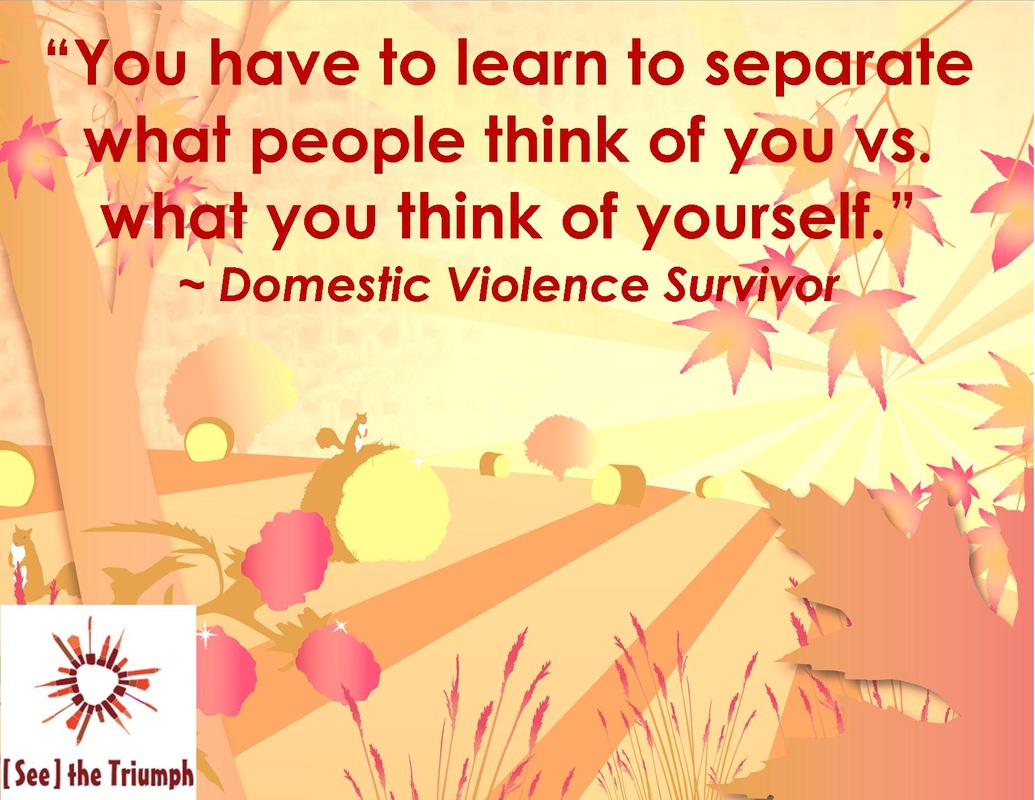
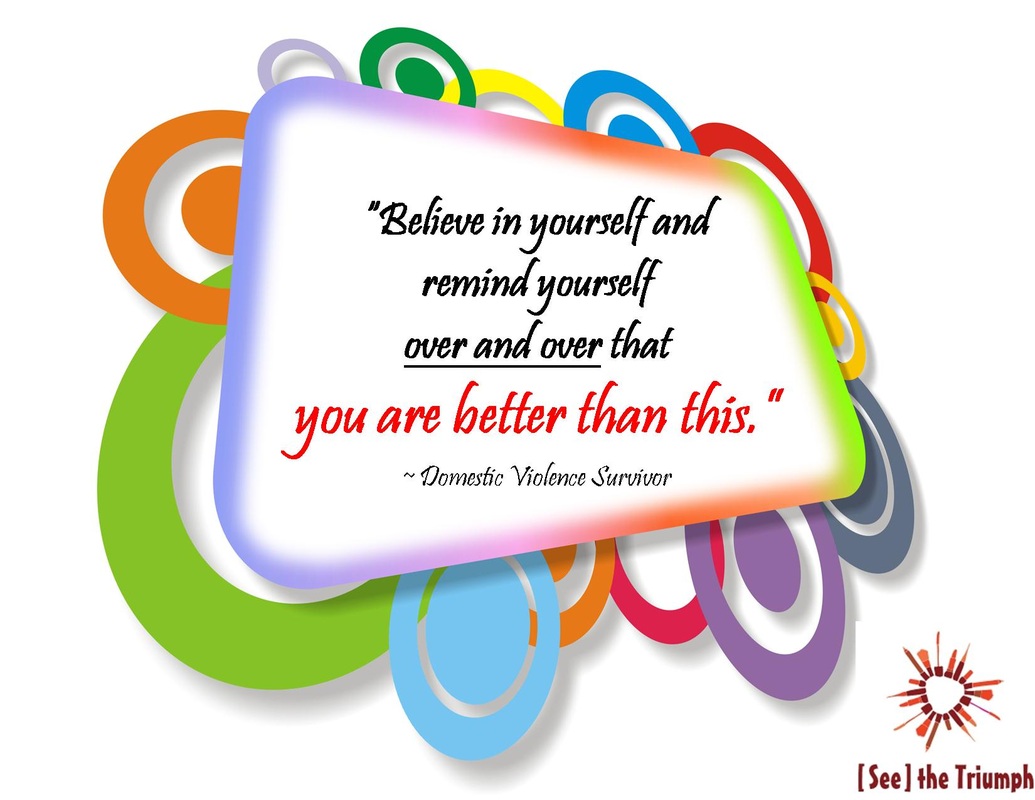
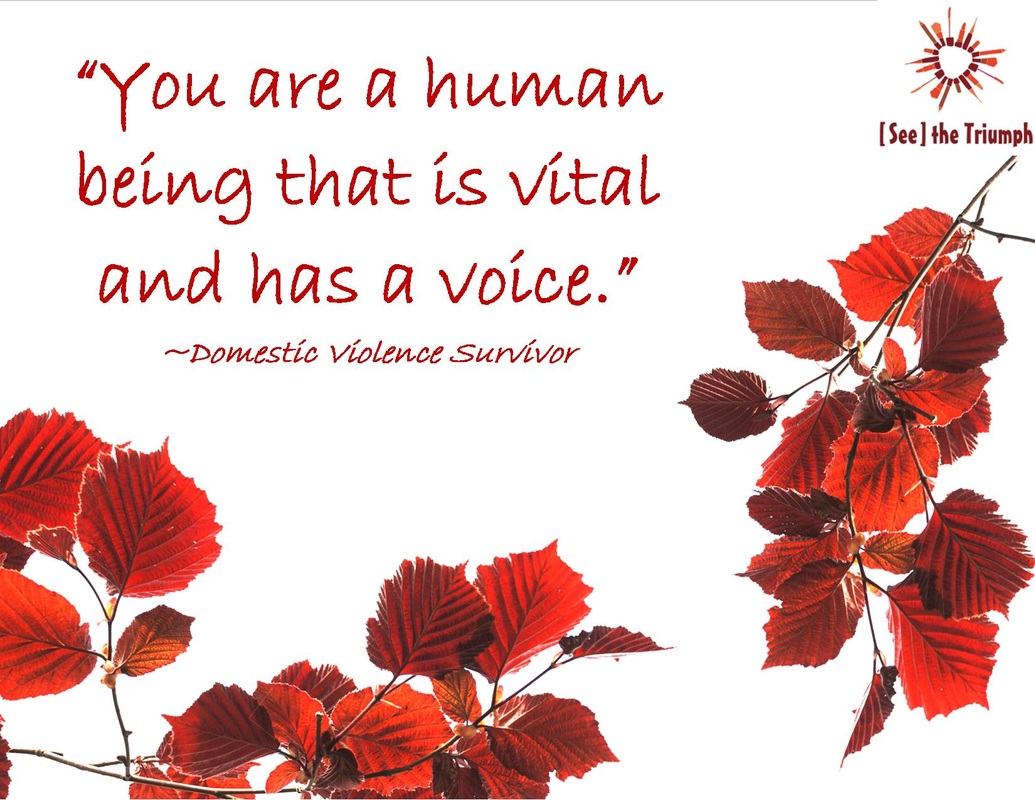
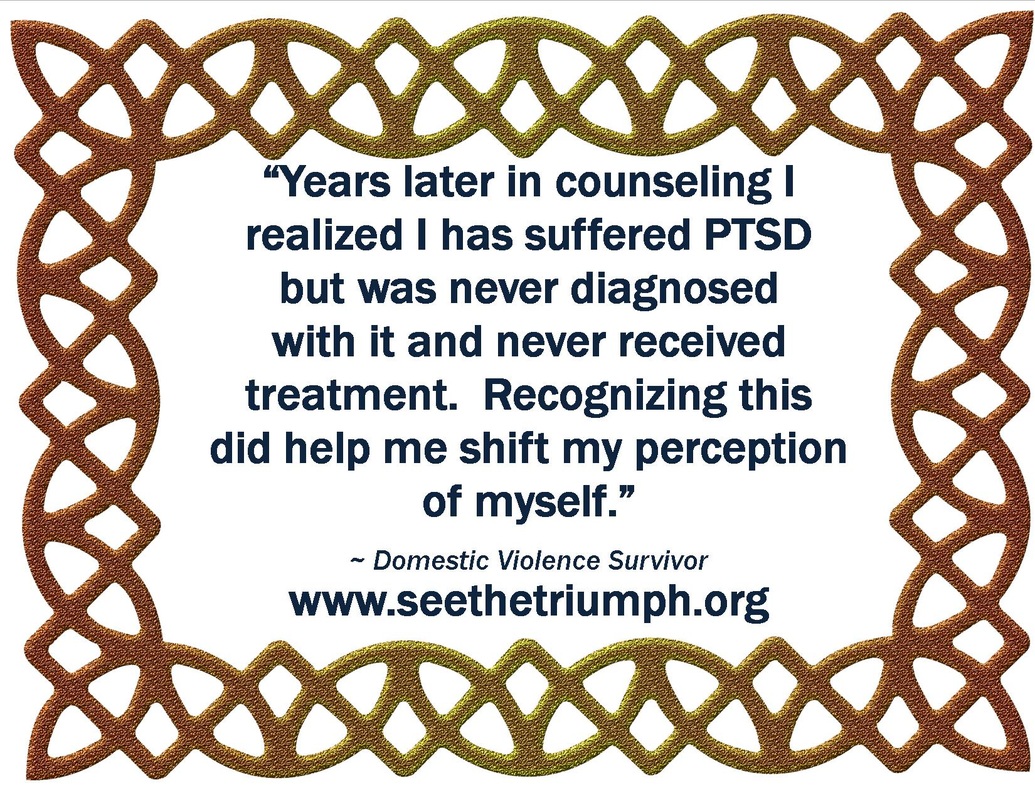
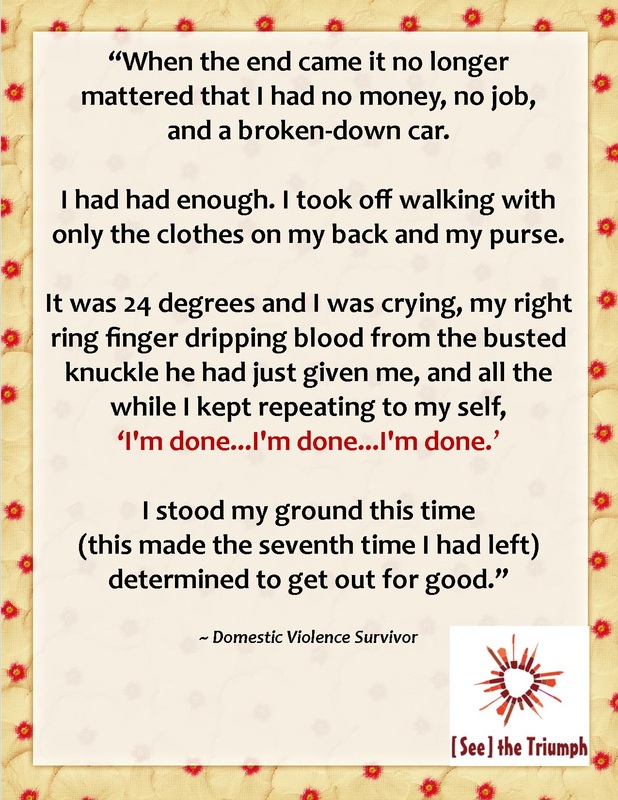
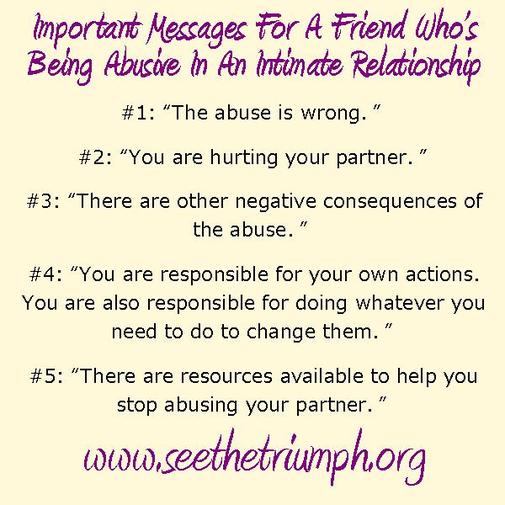
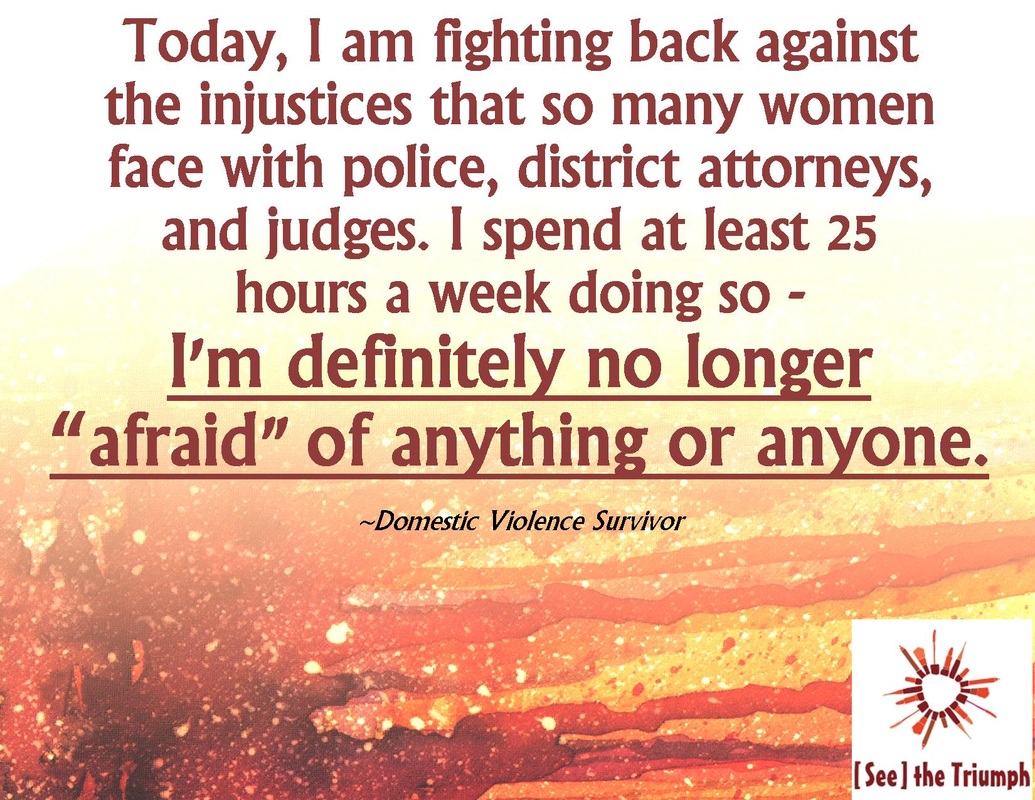
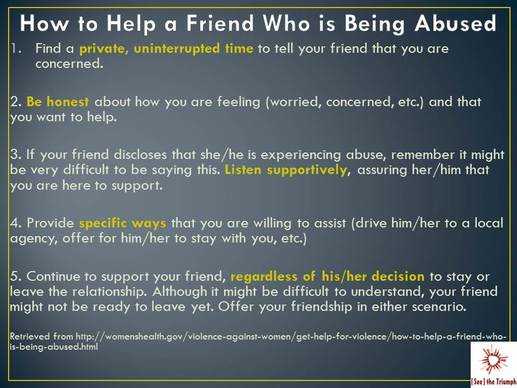
 RSS Feed
RSS Feed